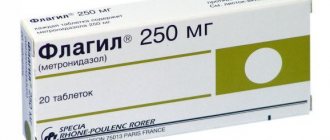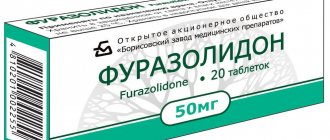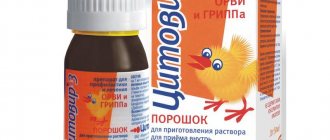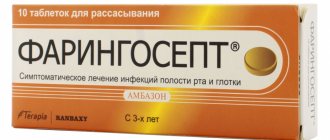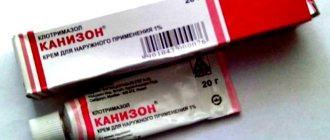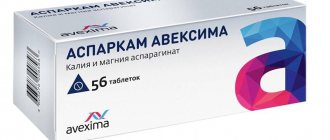Indications for use
Azathioprine tablets are prescribed in the following cases:
- prevention of graft rejection in patients receiving allogeneic kidney, liver, heart, lung or pancreas transplants;
- severe active rheumatoid arthritis;
- severe or moderate inflammatory bowel disease (Crohn's disease or ulcerative colitis);
- systemic lupus erythematosus;
- dermatomyositis;
- autoimmune chronic active hepatitis;
- polyarteritis nodosa;
- refractory cardiac autoimmune hemolytic anemia;
- chronic refractory idiopathic thrombocytopenic purpura.
Action of azathioprine
According to the classification, the medicinal substance belongs to immunosuppressive drugs. Also refers to antimetabolites. After entering the body, the chemical compound disrupts cell division and the growth of individual tissues. Suppression of the body's defense system is due to a violation of the cellular component of immunity and suppression of a delayed hypersensitivity reaction. Eliminates the effects of tissue incompatibility. Slightly affects the production of immunoglobulins.
Compared to other medications of this class, it better suppresses the immune system against the background of a lesser cytostatic effect.
Additional properties
- Affects cell metabolism, suppressing the formation of nucleic acids.
- The use of large dosages can disrupt the functioning of the bone marrow with the development of deficiency of granulocytes and leukocytes.
- Tumor cells may become resistant to this drug.
Interaction of Azathioprine and other drugs
Taking allopurinol and febuxostat with azathioprine may increase the level of azathioprine in your body and increase the risk of side effects.
Taking medications called aminosalicylates with azathioprine may increase the level of azathioprine in your body and increase your risk of bleeding disorders.
Using cotrimoxazole with azathioprine may reduce the number of white blood cells in the body needed to fight infection.
Using drugs called angiotensin-converting enzyme (ACE) inhibitors with azathioprine may increase your risk of developing blood disorders.
Using ribavirin with azathioprine may increase the levels of azathioprine in your body and increase your risk of side effects.
Side effects of the drug Azathioprine
Possible secondary infections, leukopenia, thrombocytopenia, anemia, development of megaloblastic erythropoiesis and macrocytosis, nausea, vomiting, anorexia, skin rash, arthralgia, myalgia, drug fever, cholestatic hepatitis. Pancreatitis, peptic ulcers, gastrointestinal bleeding, intestinal necrosis and perforation have been reported in transplant recipients. There are isolated reports of side effects such as acute renal failure, hemolytic anemia, acute pulmonary diseases, and meningeal reactions.
Application and dosage
The dosage and duration of administration are determined by the doctor individually. For transplantation, the initial dose should be no more than 5 mg/kg/body weight/day. The maintenance dose can vary from 1-4 mg/kg/weight/day.
For the treatment of chronic active hepatitis, the dosage is usually 1.0 to 1.5 mg/kg/weight/day.
For the treatment of other conditions, the initial dose is 1-3 mg/kg/wt/day and should be adjusted according to clinical response and hematologic tolerability.
Composition and release form
Azathioprine is an active component with therapeutic properties. A standard tablet contains fifty milligrams of the substance. Additionally, the tablet form may contain starch, milk sugar, calcium salt of stearic acid and gelatin. The composition depends on the manufacturer.
Package
Available in tablet form for oral use.
Instructions for use of azathioprine
The drug can only be prescribed by a doctor after diagnosis. The specialist selects an effective treatment regimen based on the diagnosis and condition of the patient. The use of other medications and the severity of the disease are taken into account. The tablets must be taken orally and washed down with enough water.
Dosage regimens are described for reference purposes. During treatment, the patient must follow the instructions of the attending physician and official instructions.
Taking pills
- Drug therapy for rheumatoid arthritis: calculation of daily dosage based on the patient’s body weight. From one to two and a half milligrams of the active ingredient per kilogram of body weight. The received dose is divided into two doses per day. The maintenance dosage can be reduced to 0.5 milligrams of the active ingredient per kilogram of body weight per day. The course of taking tablets should last at least three months.
- Reducing the risk of complications due to rejection of transplanted tissues or the installation of transplants: first, a large dose based on body weight. Five milligrams of active ingredient per kilogram of body weight. The resulting dosage is taken in two or three doses over one or two months. Then a maintenance dose of one to four milligrams per kilogram of body weight is taken for several years. After cessation of therapy, the dosage is reduced in stages. If symptoms of a tissue incompatibility reaction appear, the doctor may return the dosage to four milligrams per kilogram. Taken together with other medications.
- Chronic active inflammation of the liver tissue: from one to one and a half milligrams of the active component per kilogram of the patient’s body weight per day. For several appointments.
- Other pathologies of an autoimmune nature: from one and a half to two milligrams per kilogram per day. The dose is taken three or four times. As directed by a specialist, the daily dosage can be increased to two hundred and fifty milligrams in three to four doses. The duration of therapy is determined by the doctor.
additional information
- Due to taking a non-therapeutic dose (overdose), undesirable reactions develop: a decrease in the level of blood cells, disruption of the liver tissue, and increased other side effects. In this case, the patient needs medical help.
- Taking allopurinol during drug therapy increases the toxic effect on the patient's body.
- Taking other medications that reduce the activity of the body's defense systems during treatment increases the likelihood of oncological and infectious pathologies.
- While taking the pills, regular laboratory tests are needed. In the first two months, the doctor should monitor the blood condition every seven days. Further, the same studies are carried out once or twice a month. Monitoring of liver parameters is also necessary.
- When used together with co-trimoxazole, the risk of red bone marrow damage increases.
- When taken together with ACE inhibitors, a decrease in the level of leukocytes in the blood is possible.
- The drug has an antagonizing effect on non-depolarizing muscle relaxants.
- The use of vaccines based on live viral particles during treatment is fraught with the proliferation of the pathogen in the body.
- The use of inactivated vaccines during treatment is fraught with disruption of the production of immunoglobulins.
- Taking a quarter of the recommended dose is recommended in case of disruption of the liver tissue, kidneys and simultaneous use of allopurinol.
Full instructions can be found in the packaging.
Seriously ill St. Petersburg residents are looking all over the country for “unused” packages of vital medicine
Looking for “stuck” packages
Three years ago, Doctor Peter already wrote about the disappearance of the immunosuppressant Azathioprine from pharmacies. Patients turned to officials, wrote petitions, begging for the return of the medicine, without which they could not live. This drug is included in the list of vitally important drugs (VED) and is used in the complex treatment of many autoimmune diseases - rheumatoid arthritis, ulcerative colitis, psoriasis, systemic lupus erythematosus. It suppresses the activity of the immune system (in these diseases it malfunctions and begins to attack its own cells), relieves inflammation and alleviates symptoms. A total shortage of the drug occurs with enviable regularity. As Doctor Peter found out, it is not available for sale in pharmacies in St. Petersburg today. Once again on social networks, residents of different cities are asking for help in finding a cure; new petitions “Bring Azathioprine back to the country’s pharmacies” are being created on Change.org.
Petersburg resident Alexey wrote to the editors of “Doctor Peter” - his son suffers from a severe form of Crohn’s disease. The disease is incurable; therapy can only slow down its progression. My son, a young man, had several operations behind him, one and a half meters of intestine were removed, the disease was already causing complications in his joints - he could not walk. Somehow I got out, my father says. Without Azathioprine, the young man faces another exacerbation with all the ensuing consequences. Now there is one pack of the drug left, which will last for 25 days. Alexey doesn’t know what will happen next.
- How do we get out of the situation? We are looking all over the country for “lost” packages,” he told “Doctor Peter.” — One was found through friends in Vladivostok, another with an expired shelf life was found quite by accident in a colleague’s personal supplies. It was only two weeks overdue - no big deal. Now my nephew is in Makhachkala, trying to find him there. That's how we live. There are many fake sites on the Internet selling azathioprine at 10 times the price, but it’s all a hoax. Advertisements appear on social networks: “I buy it for myself, I can buy it for you too.” The money is sent and then there is no end to be found. Many people in need of the drug were deceived. Russian "Azathioprine" is cheap, cost 238 rubles. I am ready to pay any money for medicines for my son, but there is nowhere to buy them. We will look in Belarus, but it is difficult - our recipes are not valid there. We will get recipes, but what to do?
As Tatyana Shashurina, chairman of the Interregional public organization “Trust” for supporting patients with inflammatory bowel diseases, told Doctor Peter, “Azathioprine” is recommended for the treatment not only of adults with IBD, but also of children. It regularly disappears from pharmacies. The last time problems began was at the end of last year - it began to disappear in different regions of the country.
— Therapy for patients with IBD is lifelong. At the same time, throughout the country the situation with azathioprine is simply a disaster. Without this drug, an exacerbation may occur, and this is diarrhea up to 30 times a day, blood in the stool, anemia, weakness, fever, abdominal pain, explains Tatyana Shashurina. — Not everyone can register for disability in order to receive the drug under federal benefits. Although now the situation has improved. Body mass index, which had long been a “stumbling block” for our patients, was removed from the criteria for establishing disability: many had a higher BMI than required because they were on hormonal therapy. In St. Petersburg, Crohn's disease and ulcerative colitis were included in the city's Social Code, as socially significant diseases and those suffering from them can receive medicines at the expense of the city budget (under a regional benefit - Ed.). In other regions, only patients with disabilities receive free medicines.
“Azathioprine” in St. Petersburg is purchased under both regional and federal benefits. As the city health committee explained to “Doctor Peter,” the drug ran out for regional beneficiaries several weeks ago and now the health department is asking the manufacturer about the possibilities of a new purchase. There is a small supply of federal benefits left - that is, only those with disabilities can receive it. As Doctor Peter found out, as of July 22, he remained in one pharmacy in the city, on Sadovaya - 300 packages.
The one and only
The immunosuppressant "Azathioprine" (INN azathioprine) in Russia was produced by only one enterprise - OJSC "Moskhimfarmpreparaty" named after. N.A. Semashko. The company's website is currently unavailable. According to Tatyana Shashurina, the phones have also not been answered for a long time. The plant in the center of the capital that produced this cheap medicine is virtually bankrupt.
As Doctor Peter was informed (a subsidiary of Rostec Group of Companies for working with non-core and distressed assets), Moskhimfarmpreparaty has been going through bankruptcy proceedings since 2017.
“Even before the transfer to the management of Rostec in 2021, the company was in dire financial condition and actually stopped producing the drug Azathioprine. Currently, as part of the anti-crisis plan, Moskhimfarmpreparaty OJSC is undergoing reorganization. Taking into account the importance of the drug, in 2017-2018 the license for the production of Azathioprine was transferred to, which released the drug with a 5-year supply. However, the shortage of medicine that had arisen by that time and the rush demand for the drug led to the fact that the stocks were sold out earlier than the estimated time,” the company reports.
There are imported analogues with the same active ingredient (azathioprine) - for example, Imuran, Imurel. They are more expensive than the Russian drug, but they can only be bought abroad - they are not registered in Russia.
— In many countries there are analogues of azathioprine. In the same Belarus, in Ukraine, where Polish and Turkish Imuran are sold. The problem happened 3 years ago. Nothing has budged. The (health) committee is not in pain. People are simply abandoned - there is no drug and no help,” says Alexey.
According to Tatyana Shashurina, all answers to appeals to local officials, the Ministry of Health, and Roszdravnadzor boil down to one thing - contact your doctor to change therapy.
Azathioprine was first synthesized in 1959. This drug is included not only in the Russian List of Vital and Essential Medicines (VED), but also in the WHO list of essential medicines necessary for the healthcare system.
Hundreds of St. Petersburg residents need medicine
Several thousand people suffer from inflammatory bowel diseases in St. Petersburg. Only about three thousand citizens are registered at the City IBD Center at the 31-hospital on Krestovsky Island. Of these, more than half suffer from Crohn's disease (54%), the rest from ulcerative colitis. Each IBD center specialist sees more than a thousand patients, most of whom have a severe, progressive course of the disease. According to the head of the center, MD. Oksana Shchukina, over the past year, about 700 people with suspected IBD or an established diagnosis were sent to the center. Taking into account the fact that three specialists of the center can take on a total of 6-9 new patients per week, most continue to be observed by gastroenterologists and therapists at their place of residence for several months, waiting for their turn to consult a specialist. Of the three thousand registered, according to the head of the center, about 15-30% need Azathioprine - that’s 500-900 people. When a problem arises with the availability of this medicine in pharmacies, doctors recommend another drug to patients - “Mercaptopurine” (INN mercaptopurine).
— Both drugs, which belong to the group of purine analogues, are present in Russian recommendations and in all European and American guidelines for the treatment of ulcerative colitis and Crohn’s disease. The mechanism of action of both immunosuppressive drugs is the same - cytotoxic and cytostatic. Both act on the activity of T-lymphocytes, explains the doctor. “But you cannot blindly replace one medicine with another. “Mercaptopurine” for inflammatory bowel diseases is prescribed in a lower dosage; a doctor must select it. It should also be taken under the supervision of a doctor in order to monitor possible side effects, the list of which has many similarities with azathioprine. The most common is a decrease in the number of leukocytes in the blood below reference values, the so-called leukopenia. It makes a person more vulnerable to other infections; agranulocytosis may develop (a sharp decrease or absence of neutrophilic granulocytes among the cellular elements of peripheral blood - Ed.) - this is a serious condition that requires hospitalization. Therefore, patients taking azathioprine or mercaptopurine have monthly blood tests to monitor for possible abnormalities.
Meanwhile, according to the instructions, mercapturine also belongs to antitumor agents. The list of indications for its use includes, for example, acute lymphoblastic leukemia and acute myeloid leukemia. Not everyone wants to exchange the proven azathioprine for a powerful oncohematological drug. For example, Alexey is a military doctor by training; he is not ready to give it to his son “under any circumstances.” The man explained his position by possible severe side effects from cytostatics. Indeed, in the treatment of inflammatory bowel diseases, in addition to immunosuppressants, there are enough other serious drugs - hormones, biological products. The instructions for azathioprine say: “Compared with mercaptopurine, it has a more pronounced immunosuppressive effect with less cytostatic activity.” In other words, it better reduces the activity of the immune system, which is exactly what is necessary for autoimmune diseases, while having less effect on the processes of growth and division of all cells in the body - unlike antitumor drugs.
However, the Belarusian “Mercaptopurine”, which the city purchases for federal and regional benefit recipients, is also in short supply today. As of July 21, there was a small supply remaining - approximately 20 packages for the federal benefit and the same amount for the regional one. There is medicine on sale - it costs between 830-960 rubles per package of 25 tablets. The original German “Puri-Netol” (mercaptopurine) is also sold. It costs not much more than the Belarusian one - about a thousand rubles.
Not included in the "gold standard"
How do patients with immunoinflammatory joint diseases, such as rheumatoid arthritis, manage without azathioprine? “Doctor Peter” addressed this question to the chief rheumatologist of St. Petersburg, Vadim Mazurov. According to the specialist, in rheumatology, the loss of azathioprine does not pose a big problem.
— In this situation, the attending physician may decide to transfer the patient to another drug. For our patients, there are not 1-2 replacement drugs, but a whole range. In general, the “gold standard” for immunoinflammatory diseases, in particular rheumatoid arthritis, is methotrexate (an antitumor, cytostatic, immunosuppressive agent - Ed.). It comes from oncology, but has been used for decades in the treatment of immunoinflammatory diseases. Expert groups around the world consider it to be the first line of basic therapy. Strictly speaking, that’s where they start. In case of intolerance or the development of side effects, it is replaced with other drugs - leflunomide (anti-inflammatory, immunosuppressive, antirheumatic drug - Ed.), sulfasalazine, azathioprine, cyclophosphamide (antitumor, cytostatic, immunosuppressive drug - Ed.). All this is one group of drugs - the so-called antimetabolites, which have an immunosuppressive effect. And “Azathioprine” has similar side effects as the other listed drugs,” the specialist said.
But rheumatologists rarely prescribe mercaptopurine. According to Vadim Mazurov, doctors already have a fairly large selection of basic drugs. In St. Petersburg, about 40 thousand people suffer from rheumatoid arthritis.
Analogues of the drug
Azathioprine is the name of the active ingredient and trade name of the tablets. You can purchase other medications based on this chemical compound at the pharmacy.
Known analogues:
- Azasan.
- Imuran.
- Azamun.
Analogue
The use of analogues must be agreed with the attending physician.
Contraindications
Some patients develop serious complications during drug therapy, so the drug is not prescribed to everyone. First of all, the medicine is not prescribed to women carrying a child due to the risk of damage to the fetus. A sensitivity reaction of the immune system to the components of the tablet form is possible. If the patient has previously been allergic to the active component of this drug or to mercaptopurine, treatment is not carried out. The medicine should not be used during breastfeeding. Also, patients of childbearing age are advised to use methods to prevent pregnancy while taking the pills.
In the presence of the following factors, treatment is carried out carefully: disruption of the liver tissue, disruption of the kidneys, chickenpox, herpes zoster, xanthine oxidase deficiency, radiation therapy, taking cytotoxic medications.
special instructions
During the first 8 weeks of therapy, it is necessary to monitor the peripheral blood picture weekly (later - 1-2 times a month). The activity of serum liver transaminases, alkaline phosphatases and bilirubin levels is periodically monitored.
The dose is reduced to 1/4 if allopurinol azathioprine is prescribed at the same time, as well as in cases of impaired liver or kidney function.
In case of chickenpox, herpes zoster or xanthine oxidase deficiency, as well as during cytotoxic and radiation therapy, azathioprine is prescribed with caution.
Absorption and excretion
The drug substance is easily absorbed in the gastrointestinal tract when administered orally. Slight binding to blood proteins is observed. The binding rate reaches thirty percent. The chemical compound is modified in the liver tissue to form active metabolites. Penetration into tissue is insignificant. A minimal amount of the active substance is found in the brain. The maximum level of the substance in the blood occurs 60-120 minutes after administration.
The half-life is five hours. It is excreted through the digestive tract with bile. One or two percent of the substance is excreted in the urine.


